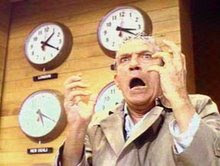"I was hopeless at maths and science. I just didn't get it." It's a statement I've heard a lot and I heard it again during a conversation I was having on friday night. It often follows the question, "So, what do you do?". Usually the topic of conversation changes and I don't get the chance to give a simple description of what science is, and how in fact most people practice science everyday without realising it. Now, one of the reasons I took up teaching was to show the beauty and power of these two topics. So here goes an attempt to give a primer on science.
You are sitting in the lounge reading a book with the lights on. At the end of a chapter you disappear to the kitchen to make a cup of coffee. You come back to the lounge room and the light is out. What do you do?
Option 1
God did it. You sit down and that's it. Some prefer this and spend the rest of their lives in the dark.
Option 2
You decide to find out why the light is out. There must be some natural explanation. Believe it or not, this is the first step in thinking scientifically. So why is the light out? The bulb may have blown.
If this is your only reason you can think of, then you are just a novice scientist. A good scientist will trying to think of many reasons why the light may be out. It may be that your flatmate came in and switched off the light, a fuse may have blown or the electricity in the neighbourhood may be out. And sometimes there are reasons that although improbable, are possible. That possum living in the roof may have bitten through the wires. A thief has cut the power to your house in preparation for a robbery.
Now you have your reasons, where do you start? The simplest explanation is usually the go so you decide to see if someone has switched off the light. You perform an experiment. You flick the switch. Bingo! You go back to reading your book. However, sometimes it's not that easy. Sometimes it requires stepping outside the current problem and making other observations and doing more experiments. You may check other appliances in the room to see if they work. This can help narrow the range of reasons. You may need to ask the advise of others who have had similar problems. You keep trying different ideas, throwing out the ideas that don't work. This way of thinking is an example of the scientific process.
The next question is, what is the difference between good science and bad science? That I'll leave to another post.
AI isn’t to Blame for Mushroom Poisonings
4 hours ago

